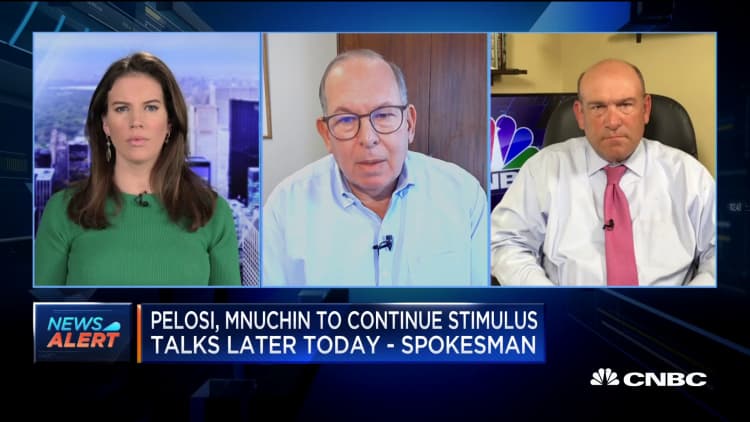About 28 million workers are either receiving unemployment benefits or have applied recently and are waiting to be approved, including the 1.5 million people who signed up for benefits last week, according to the Economic Policy Institute.
But those workers are getting far less in unemployment insurance benefits than just a few months ago. As part of the so-called CARES Act, Congress set up a new federal program that paid out an extra $600 a week on top of state unemployment benefits. But the program expired at the end of July, and lawmakers have been unable to come to an agreement to extend the benefits.
Although President Donald Trump signed an executive order that provided a temporary $300 weekly federal unemployment boost, the effects of the benefit cutbacks is already beginning to impact the economy.
Total personal income in the U.S. took a $667 billion hit during August (on an annualized basis), according to EPI's Josh Bivens, who based the analysis off new data released by the Bureau of Economic Analysis on Thursday.
"It would have been more, but some of the enhanced $600 payments spilled over into August data," Bivens writes. How does that translate to individual workers though? Bivens says you can think of it as an across-the-board pay cut for all U.S. workers, which adds up to a roughly 7% drop. In September, Bivens estimates that this "pay cut" will be closer to 10%.
Yet despite the decline in personal income, there hasn't been a wide-scale economic fallout to the nation's gross domestic product (GDP) or employment. In fact, employment rose in August.
But Bivens says the decline in personal income has been offset by the ongoing business reopenings. "These are obviously not normal times," he says. "Given how utterly enormous and widespread these shutdowns were, it is unsurprising that even partial reopenings have led to very large increases in GDP and employment from the Covid-19 trough of economic activity."
"As we enter October, the reopening effect will likely continue to provide a mild boost to the economy's growth, but a massive resurgence of the virus could spark reversal on this front," Bivens adds. Yet even if the U.S. doesn't experience more shutdowns, over time, Bivens warns that the drag on income growth will overwhelm the positive effects.
"The massive negative effect on incomes stemming from the expiration of the enhanced UI benefits will weigh heavily on growth," Bivens says. Unless, of course, lawmakers change course.
House Speaker Nancy Pelosi and Treasury Secretary Steven Mnuchin restarted negotiations over a potential stimulus package this week after Democrats proposed a $2.2 trillion legislative relief package Monday night. The initial proposal includes restarting the $600 unemployment boost. The House of Representatives has delayed voting on the bill to give leaders a time to broker a bipartisan deal.
Check out: We analyzed 111 rewards cards, and the best one could earn you $2,000 over 5 years
Don't miss: A guide to resources that can help you pay bills now, from rent to health care



